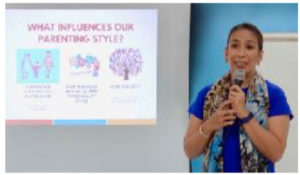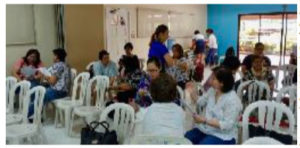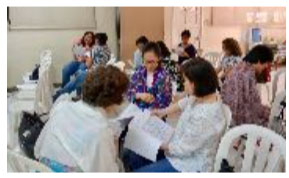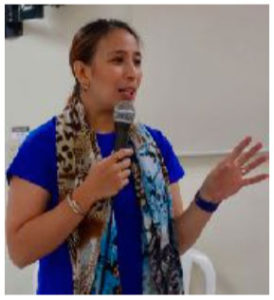Did You Know That You Need to Change Parenting Styles As Children Grow?
 CTK’s Family and Life Ministry, headed by Regie and Joanne Polancos, held a talk on effective parenting last April 28, a Saturday, at the CTK Formation Center. The talk was given by Dr. Joanne Trina Moreno-Javier, Chair of the Developmental Psychology Division of the Psychological Association of the Philippines.
CTK’s Family and Life Ministry, headed by Regie and Joanne Polancos, held a talk on effective parenting last April 28, a Saturday, at the CTK Formation Center. The talk was given by Dr. Joanne Trina Moreno-Javier, Chair of the Developmental Psychology Division of the Psychological Association of the Philippines.
 Joanne is a licensed psychologist and certified developmental psychologist and is currently completing her dissertation for her PhD in Developmental Psychology. A member of Artpsychcircle, she has created modules and facilitated sessions for psychosocial intervention for underprivileged and abused children. She is a registered professional teacher having taught preschool, high school, college, post-graduate, and adult education for 14 years. She has designed and taught programs on early childhood care and development. Dr. Javier is currently a life coach consultant of a private organization that provides counseling services to its corporate clients and holds the title of Deputy Director for the company’s e-learning division. She has her own private clinical practice at ILAW Psychological Services.
Joanne is a licensed psychologist and certified developmental psychologist and is currently completing her dissertation for her PhD in Developmental Psychology. A member of Artpsychcircle, she has created modules and facilitated sessions for psychosocial intervention for underprivileged and abused children. She is a registered professional teacher having taught preschool, high school, college, post-graduate, and adult education for 14 years. She has designed and taught programs on early childhood care and development. Dr. Javier is currently a life coach consultant of a private organization that provides counseling services to its corporate clients and holds the title of Deputy Director for the company’s e-learning division. She has her own private clinical practice at ILAW Psychological Services.
 She posed the question, ‘What influences our parenting style?’. To which she answered that it was a combination of our own childhood experience, our inherent and acquired personality style, and our society.
She posed the question, ‘What influences our parenting style?’. To which she answered that it was a combination of our own childhood experience, our inherent and acquired personality style, and our society.
Joanne gave a 30-item quiz which allowed the participants to identify their beliefs about being a parent. To summarize, parents tend to adopt one of three styles, or some combination of:
1. autocratic style. This was the predominant style parents used when you were growing up. Parents using this style find themselves in frequent battles with their child. Anger and frustration probably characterize the power struggles that you and your child experience. Parents using this style tend to look for a more successful approach.
2. permissive style. In an attempt to avoid being autocratic, you may have over-compensated and developed a permissive style. Your relationship with your child may be pretty good as long as you do what your child wants. But you probably find that your child gets very hostile and perhaps even throw tantrums when you say no or make a demand of him or her. Your relationship is characterized by service and pleasing but only in one direction. You may already have begun to resent this unfairness. It is easy to get fed up with a permissive approach and Clip back to an autocratic one.
3. active (or democratic) style. If you scored highest on the style, your relationship with your child is probably already positive. Though problems certainly occur, an atmosphere of mutual respect, trust, and teamwork enables you to handle them without the hurt or resentment that characterize the other styles. You are probably unconsciously using many of the methods advocated and taught in ‘active parenting’.
 Some parents will score very high on only one style so they clearly tend toward that style pf parenting. Some will have two scores on two styles that are relatively close to each other, then they would be using two styles at the same time. The quiz also differentiates between belief and action so where the belief score is markedly higher than the action score, it would suggest that you tend to believe one thing but do another. This is more common than you would think.
Some parents will score very high on only one style so they clearly tend toward that style pf parenting. Some will have two scores on two styles that are relatively close to each other, then they would be using two styles at the same time. The quiz also differentiates between belief and action so where the belief score is markedly higher than the action score, it would suggest that you tend to believe one thing but do another. This is more common than you would think.
Joanne made it clear that parents need to change parenting approaches as the child ages. For toddlers and very young children, the operative word is ‘control’, where the parent sets boundaries, uses reward and punishment, and handles the child’s temper tantrums.
For children and pre- teens, the key word is ‘coach’, where the parents model the proper way and values, initiate bonding activities, introduce ‘individual time’, and begin to reason with them.
For teenagers, the word to keep in mind is ‘counsel’. The parents should be there to listen, to communicate in the teen’s language (‘teenlish’), to respect the child as an individual, and to empower.
 Joanne gave five mini-case studies, the first involving a toddler, the second a five year old, the third a seven year old, the fourth a 13 year old, and the last case a 17 year old. She had the participants group themselves into small groups and discuss what they would do and what parenting style that would point to.
Joanne gave five mini-case studies, the first involving a toddler, the second a five year old, the third a seven year old, the fourth a 13 year old, and the last case a 17 year old. She had the participants group themselves into small groups and discuss what they would do and what parenting style that would point to.
Dr. Javier spent a bit of time on the power of social media and its implications for parenting. Her advice to parents –
- leverage the technology, using it as a planorm to communicate especially among teenagers. Have ‘online Fme’ with your child.
- establish boundaries, especially, restrict usage and monitor your child’s acFvity online.
- educate them and yourself about its use. The internet is not just about social media but a great educaFonal tool; explore it together.
In closing, Joanne gave several catchwords to connect with your child across the different ages – share ordinary time; create special time; stay involved and interested; communicate, communicate, communicate; practice active listening; give them space and privacy; and respect their choices.
